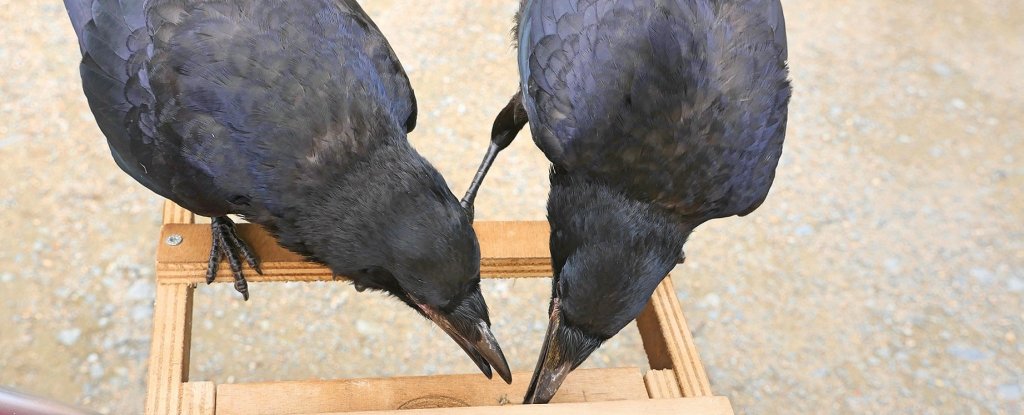Credit Where It's Due : The Intelligence of Birds
"The purpose of the crows ... is to educate the people, to open their minds, to think, 'OK, the birds are able to do something that we are much more able to do than them, so we should do this by ourselves',"
"It's a funny way to show the people that you cannot throw the papers everywhere."
"In an affectionate, supportive atmosphere, they like to communicate with humans and establish a relationship through play."
"The goal is not just to clear up, because visitors are generally careful to keep things clean, but also to demonstrate that nature itself can teach us to take care of the environment."
Park President Nicholas de Villiers, Puy du Fou park

"I captured a series of crows in a park, tagged them and released them. They didn’t like it."And they are indeed intelligent. Some species more so than others. Some, like parrots and crows whose tongues have been slit, can be taught to 'speak', emulating words taught to them, and knowing their correct context; uttering them at appropriate times and circumstances; in some instances reflecting their own emotions. They have excellent memory recall, and we tend to do them an injustice when we relegate them to the status of animals incapable of thinking, assessing situations, making use of their environment in unusual ways, and being capable of interacting with other species, including humans.
"Many weeks later, I returned to the park with colleagues, and the crows I had tagged attacked me but ignored the others."
Frédéric Jiguet, ornithologist, Paris Museum of Natural History
 |
| Rooks have the ability to sort out litter. (Photo: Puy Du Fou blog) |
A park in France has taken steps to use the innate intelligence of rooks, a larger, even more clever offshoot of the crow family to teach them to pluck litter left by careless park visitors and deposit that litter in waste containers on regular park patrols. The birds, six of them, have names: Boubou, Bamboo, Bill, Black, Bricole and Baco. Each time they deposit a cigarette butt or any other piece of trash in a special receptacle, it dispenses a treat. There are times when birds like any other animal, will commit altruistic acts, but this is a working environment that compensates their labour.
The birds would not consider what they do labour -- in all likelihood it is for them something akin to a game where they offer something of value to their trainer to be disposed of, and anticipate a reward in recognition of their effort. The trainer, to illustrate just how clever the birds are, speaks of their attempts to innovate, by bringing along slivers of wood to exchange for the treats. The park in question is a theme park; what better place to deploy such activities to demonstrate the birds' capacity to learn and to engage in a trade; their worthless (to them) offerings for valuable food.
 |
| The mechanism that has been created for the crows to collect the trash. (Photo: Puy Du Fou blog) |
Working industriously, they are able to fill a bucket with disposables in fewer than 45 minutes. It was a bird handler, a park falconer who first thought of putting the birds to work. Accustomed to training birds of prey, Christophe Gaborit explained: "They were motivated by the reward and they soon understood how the game worked". And it would certainly not have been a difficult thing to entice the birds to collect trash for reward. Some biologists consider them to be as intelligent as the average seven-year-old child.
They have demonstrated how they prepare tools by tearing strips from leaves, using the strips to pry bugs from tree trunks. In experiments they have been innovative in response to situations where they have manipulated material to advantage themselves in some way. Given wire, though never having encountered it before, they will bend it to fashion hooks. Given unshelled peanuts, they will smash the peanut held in their beak against a hard surface to open it and release the nuts. They will remember the faces of people who habitually take peanuts into a park to deposit them in various places. Thereafter the birds regularly visit those places, in competition with squirrels.
Some scientists decided to test the rooks through an experiment, placing litter in a room with a worm in a tube of water slightly below the distance the birds could peck. The birds responded by dropping pebbles into the water gradually lifting the worm within reach. Those filler objects too large for the container, or that would float in the water were rejected in favour of the pebbles which sank to the bottom as required to achieve their goal; more than adequately demonstrating their grasp of volume displacement.
 |
| Gabroit with his rooks. (Photo courtesy: Puy Du Fou blog) |
Labels: Birds, France, Intelligence

0 Comments:
Post a Comment
<< Home